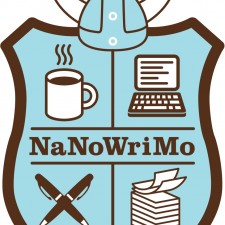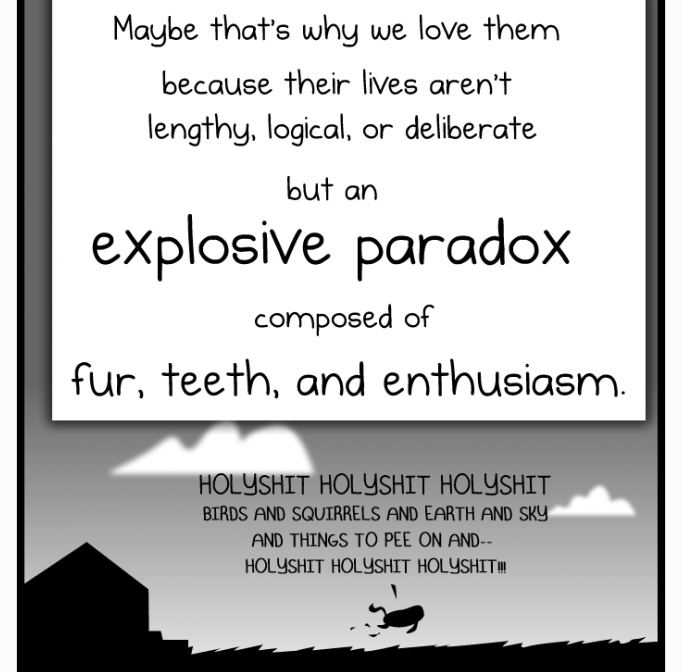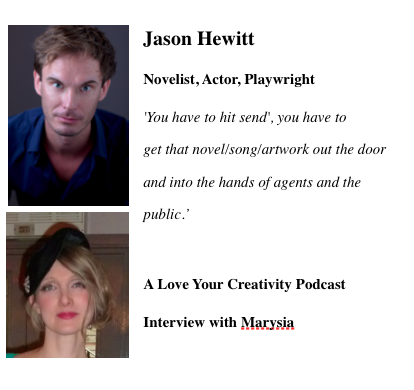 1: How to be a published writer: Marysia's Podcast with Jason Hewitt [ 39:09 ] Play Now | Play in Popup | Download
1: How to be a published writer: Marysia's Podcast with Jason Hewitt [ 39:09 ] Play Now | Play in Popup | DownloadLove Your Creativity.com is dedicated to all creatives trying to make great work and make a living from it.
In this podcast I interview Jason Hewitt whose novel ‘The Dynamite Room’ is being published by Simon and Schuster in Spring 2014. It is a very inspiring story with lots of tips on how he kept going despite so many rejections as well as his writing process.
- Jason Hewitt
- Me no photoshop – just me 😉
- Me no photoshop – just me 😉
The full transcription of the interview is below if you would rather read than listen to it.
The big takeaway for me is ‘You have to hit send’, you have to get that novel/song/artwork out the door and into the hands of agents and the public.
You have to be willing to let go of the work you have done and release it out there; send it to an agent, perform it live, even to when you have to hand over your ‘finished’ novel, because of course we all know ‘art is never finished, only abandoned’ according to Leonardo Da Vinci.
He also covers how he managed to keep working on his novel, even when he was also studying to be an actor, doing a play, working part time all whilst concurrently doing edits suggested by his agent in an effort to get the book sold.
Hope you like the interview and come away motivated to pick up whatever project you are working on at the moment and carry on working.
Comments are very welcome!
You can contact Jason Hewitt as follows
Jason Hewitt: Writer – Actor – Playwright
The Dynamite Room will be published by Simon & Schuster in 2014
Literary Representation: http://www.janklowandnesbit.co.uk/
Website http://www.jason-hewitt.com/
Actor’s Spotlight pin: http://www.spotlight.com/interactive/cv/2612-4505-9285
Follow on Twitter: @JasonHewitt123
Facebook: http://www.facebook.com/TheDynamiteRoom
FULL TRANSCRIPT
Hi, this is Marysia for loveyourcreativity.com. Today I am interviewing Jason Hewitt and it’s just an awesome story of an author who spent a long time writing, rewriting and failing, to finally get the really big book deal. It’s just amazing to hear the stories of how many times he’s had to pick himself back up again. There’s lots of great takeaways from how to keep going forward, how to deal with rejection, and ultimately just how to hit send. How you’ve got to let it out of the door. You’ve got to get that first draft to an agent or finally when it’s about to go to print. So enjoy!
Marysia: Hello Jason! Welcome. Thank you for coming in to do this. This is the first official loveyourcreativity.com podcast. The idea of all of these is just to get an idea by creative people on all walks of art in life, how they manage to keep going through the successes and failures. Any tips you can pass on? You have got your very first published novel coming out next year, right?
Jason: Yes, that’s right.
Marysia: And it’s called The Dynamite Room.
Jason: Yes.
Marysia: Obviously it’s a bit different with this interview because I was with you last summer, so summer 2012, the day you got the call from the agent about your publishing deal. I remember it was quite a day. So can you talk to me of the process up to that? Was this the first book you had written?
Jason: No, I had written two before. I wrote one after I finished university which I really didn’t do anything with. Then I went to do an MA in Creative Writing at Bath Spa University. That’s where I wrote my second novel which took me many years to complete and it was that novel that got me an agent but that was not The Dynamite Room. We tried to sell that and ultimately failed after a couple of years. Then I wrote another one which became The Dynamite Room. So it’s been quite a long process. The Dynamite Room is my debut novel but it’s actually the third novel I’ve written.
Marysia: Over a period of what, maybe ten to fifteen years?
Jason: Yes, about fifteen years.
Marysia: Wow so you must’ve had a real kind of sense of ‘I have something here’. Did getting an agent on your second novel made you think ‘well I’ve got something here’ and so you went on and wrote the third. I know it’s exhausting to keep polishing and try to work out what it is that they want or will sell.
Jason: Absolutely the first one I didn’t do anything with, that took me 5 years to write. Then the one that got me the agent, that took about 3 years. Getting an agent definitely boosted my confidence. I suddenly thought ‘Oh my God this could actually happen. This could really work. I can actually get this one published” and then we didn’t manage to sell it. So getting an agent was definitely a boost but there were still bumps in the road after that point, as well.
Marysia: Did he/she tell you, ‘We’re not going to get this one sold. Can you write another one, please? “
Jason: Yes, he basically asked me. Even before he started selling that novel, he said ‘Okay you need start writing another one because writing one novel doesn’t make you solely an author. You need to kind of write lots of novels”. We had one publisher that was interested but ultimately didn’t buy the book but was interested enough to ask if there was going to be a second book and what that was about. At that point I had to come up with an idea very quickly off the top of my head over the phone. I basically spurted out this idea. It was basically a different story to the novel we were selling at that time. The Dynamite Room was set in WWII and the one I have written before that wasn’t bought by anyone was set in modern day Sweden. So you couldn’t be much more different than that, really.
Marysia: I’m interested in that process. Some people write and try to sell their idea. I have a friend of mine who is a very successful ghostwriter. So they sell the project before they actually write words. I mean, I’ve done lots of shows where the deadline for Edinburgh or Brighton or whatever it is, is we need fifty words on what your show is about. You’re thinking I haven’t written a word on this but then you end up almost sticking yourself into a parameter and having to write your parameter, almost.
Jason: Yeah, absolutely.
Marysia: Which kind of helps maybe?
Jason: I think so. It does to some degree because it gives you some guidance and I’ve just started writing a new novel. I got a two book deal so I have to basically get them another novel at the end of this year. I started writing that one and that again came off me accidentally spurting out to my editor at Simon and Schuster which was an idea of a follow up. She liked it and I thought
‘Oh heck. That means I have to write this one as well”
So I’ve told many people about it which I think is a bit of mistake, it means I cant really go back but I will make it work. The Dynamite worked so I’m hoping it will work again.
Marysia: I just think it’s magical. I love that. How did you, over fifteen years, write three books and keep going? Did you have a support system or was it… did you say every day that I’m going to write for half an hour? I mean, what did you use to keep moving forward?
Jason: I set myself deadlines which I then failed to keep on a regular basis. But the fact that I set myself deadlines, I’ve made this chapter in such and such date or the first one hundred pages by such such date. Just by giving myself a deadline gives me something to aim towards. I know I missed them regularly but at least I’m moving forward all the time. When I did my MA at Bath, I belonged to a workshop group, there were 7 of us and we still meet up on a regular basis. As I was writing Dynamite Room, I would give them chunks of it all the time. I would promise I would get them the next chunk in time for the next workshop for them to read. So again that gave me a deadline. Otherwise life gets in the way. I’m so busy. I was trying to balance writing along with other projects and work and stuff. You got to be strict with yourself.
Marysia: It’s like ‘I can’t not aim to hit a deadline’ isn’t it? Especially if people are putting time to read something and all that seven, who else is published?
Jason: We have an amazing group so I am the 6th person who gets a publishing deal. The 7th person is I think he’s about to send to other agents. So we’ve been really really lucky and really supportive and also pulled my novel to pieces and batted me around. Genuinely told me that this doesn’t work and characters don’t work. Without them, it wouldn’t become the novel that it has become. It also taught me to have a tough skin, as well because sometimes you hand them all the work, whole weeks of writing and they just say ‘You know what this isn’t working, it’s not going anywhere or I don’t understand your character or the plot doesn’t make sense or whatever”.
You have to pick yourself up the floor, go home, and hide under my stove for a few more weeks. Start all over again; put a red line on it.
Marysia: So how long was that process? How long did it take you to start the Dynamite Room from this idea you had with you.
Jason: I think it took me probably two years to get it to a point where it was ready to go to my agent. A year of that I was actually doing research because that was set on WWII, I’ve got a history degree but actually I avoid WWII like the plague, so to speak and basically started most my degree on medieval history. So I had some gaps in my knowledge.
Marysia: But at least you have proper grounds in research.
Jason: Oh yes and I love the research. That’s one of my favourite parts of it. So I love finding out interesting new stories. A little tip, here’s the fact that most historical writers cram their novel, when you do the first draft, you cram loads of facts in and end up taking them out because they’re getting in the way of the story. It took me probably about a year to research and year to write. I was very fortunate and the job I had at that time gave me three months sabbatical. So I wrote the first draft in three months, actually it wasn’t three months before I spent the first month primarily sitting down watching films. I thought oh it’s been a month and I haven’t done much so I panicked. Then I wrote the first draft.
Marysia: I’m loving this. Then what? Because I have written two novels, don’t worry I’m not going to make you read ‘em!
While I was on draft 5, I haven’t had to think of a synopsis and then you try to write a backjacket of these ideas, you’re trying to, of course I wrote quite a funny backjack but the book is actually more serious but I didn’t have the courage to put it in an envelope and send it to an agent. So what made you see that “I’m finally going to get novel one and indeed novel two out to an agent”, what is it that made you do that?
Jason: Well novel one, the one I wrote years ago I sent to one agent and he very kindly turned it down and said that it wasn’t any good. I really didn’t believe in it myself so it kinda got discounted. The one I wrote during my MA, I had an MA course and everyone’s aim was to get an agent so I kind of got swept along with the flow. I was fortunate in many respects because I, as part of the MA, we produce an anthology of extracts from the year group. I volunteered to be the editor of an anthology of extracts from the year group and I volunteered to be the editor. After the MA has finished, I, then spent months working with a colleague of mine producing the book, developing it, arranging the cover, organizing a launch party, so basically creating a book from scratch. We then sent out to agents to try and get deals for all the people on our MA course, quite a few of them got agents off the back of the anthology, which is great apart from me. So I was slightly miffed but never mind. So I didn’t get an agent. I think maybe I got a round of applause and a bunch of flowers at the launch party. That’s probably about it.
Marysia: No wonder they were were all so eager to get you going.
Jason: Basically a year later, the literary agency that I’m now with Janklow and Nesbitt, all of the women that worked there, Jennifer McVeigh, who is now a successful author on her own right emailed me “oh you’re the editor of this anthology, can you send me the new edition?” I said oh “I’m not doing the course anymore, I finished. I was just a student, however, I just happened to finish my novel, would you mind if I send it to you?” She said yes. That’s how really how I got my agent. She then left and I basically end up with the agent I got now, Francis, who I met several times before. It was all through luck.
Marysia: It’s that thing that you make your own luck and if you haven’t spend giving a lot of time on making a great anthology, she would not be on the phone with you.
Jason: No and I think… I put the work in and I was very opportunistic and made it as good as I can possibly make it. The funny thing was, I sent her the novel and three-four days later, she emailed me and she said ‘Oh my god I’m only halfway through but I absolutely love this. You can come and see me as soon as possible”
I got really really excited. I went in to see her, I appeared in a week later and she said “I really love the first half but the second half is not just working for me. It’s just not very good.” This is what I said earlier about many bumps in the road. Having like a real high and hitting the ground with a mighty crash then I spent another year working on that one which didn’t sell.
Marysia: It’s about the persistence and it’s the keep on going, isn’t it? You have to take the breaks you get. Yes you will fall down but you have to take the breaks and go okay I know what I’m doing.
Jason: I think almost the longer it takes the more you believe that this is what you’re supposed to be doing. I had a bit of a wobble after we didn’t sell the previous novel which made me want to go into acting. It’s kind of bit of a sideline. Another goal I wanted to do was diversion because I felt a bit down. Ultimately I knew I was going to write something else and I knew it will be a continuous part in my life. The longer I do it the more I realize that I will always be writing something. I think you need to have that belief if you really want to do it, with anything actually. You think about your comedy or acting or anyone that does something that’s artistic, that doesn’t have a regular salary.
Marysia: It’s blind faith
Jason: Yeah absolutely.
Marysia: I was at the Actors Centre a couple of weeks ago with Timothy West and Clive Swift was interviewing him and someone had asked about being an actor and Clive said something about “You have to bloody do it”. Timothy West was pretty much “If you’re going to be an actor you will be an actor”.
If you really do want to be an actor or be on stage and have that conversation with people, I think it comes that you question it, you run away from it, you distract yourself. You spend a month with yourself eating popcorn and getting fat. But you always come back to it and I think it’s about trying to get more and more in growing the habits that make and improve yourself, to keep me going forward because otherwise you’ll go mad. You know you’re supposed to be doing X so why are you doing Y? Did you think “I can’t sell my second novel I’m going to do something else creatively to get rid of this, so I am going to act”. Is that how it happened?
Jason: A little bit. I’ve always wanted to act but I never really had the opportunity to do it. There wasn’t really any acting opportunity in my secondary school. Then I went to a university where, there was a drama course there and I didn’t know people that was studying drama but I felt that I was on a different course already, I was heading a different direction. I may have felt this having one artistic and the dream was more than enough, thank you very much. So I kind of pushed it to one side but I always had this secret hankering and it was only where we didn’t sell the previous novel. I thought ‘Oh my God I need to do something else, I’ve got to start another novel and it will take three or four years to do, I’m going to start again from scratch”.
Also, writing, you spend a lot of time sitting your ass and I’m a bit fidgety. So I need to get up and do more stuff and be more active and be a sociable person and writing is quite solitary.
Marysia: I see you all the time in the pub 😉
Jason: I do like to go around and have fun. Acting seems to be that I could be very socialable as well.
Marysia: And actors are, definitely. Timothy West said this as well, he wrote an autobiography at 68, ten years ago, and when they republished it, he had to add an extra chapter because he’s carried on. The point is he said actors are great people to be around because they’re lovely company and they’re funny.
Jason: The stage wasn’t my life. I’ve written three books, managed to get an agent for the second book, haven’t sold it and I felt abandoned. The great thing about actors is that they’re always there to give you a hug even if they don’t know you. So I basically feed myself into that. I took a class and ended up being a better actor that in a million years I imagined I would be.
Marysia: Well possibly, the attention to detail you need to do for acting is already the kind of research you do and then to write about it. It’s also part of the research you need to do in a character.
Jason: I’ve started to write plays, writing plays and writing fiction, they’re all linked in together so beautifully well. They all bounce off each other.
Marysia: Yes because you can also develop them… I did a workshop with a director called Glen Walford, fantastic director. I’ve seen her work; she does a lot of Willy Russell stuff, she directed Shirley Valentine a few years ago, I saw it and it was great. This incredible workshop and this incredible director and you forget what it’s like to work with these famous directors. There’s a reason, because they can get things out of you that you just don’t understand. But she was an actor first, as well. I almost think maybe you can write a better character because you’ve had to build your own character and put him on stage.
Jason: Yeah, they definitely help building characters both ways. When I’m writing fiction now, anyone that lives down my street, I usually write them down. If I’m in the lounge I act out some scenes that I’m going to write so that I could see the physicality of things.
Marysia: So you do that bagmasking exercise we used to do? So you get to be the boy and the girl?
Jason: Yeah I can pretend I’m a German soldier and the next thing I’m a twelve yearold girl.
Marysia: Do you also hide underneath chairs? Do you go that far?
Jason: If I have got furniture around but yeah I act out the scenes. With the acting, I can understand dialogue more easily because I write it and creating character.
Marysia: I am looking forward to reading your novel because I remember in audio class you read an extract and it was magical, chilling, it was ‘Oh my God what’s happening next?”
It was fantastic. I didn’t at all know all this back story, I mean I didn’t appreciate it in the 5 minutes I got. It really grabs your attention. Even now I can remember the feeling. So I’m sure it’s gonna be huge. So do you have any time management techniques to pass on to? For those of us who are getting our projects up and forward? Getting agents and placing deals. All the time management to keep you on the track of moving. You mentioned deadlines earlier, didn’t you?
Jason: Yeah deadlines. I’m rubbish at time management.
Marysia: But you managed to keep going. So what is it that you told yourself to keep going then?
Jason: I try and do something for the writing, in particular, every day. So there might be writing, there might be reading or research or it might just be jotting down some notes in the notebook. So I try and make it fresh in my mind everyday. The great thing about my life at the moment but also one of the problems is that I have lots of projects at the same time. So I have to make sure I’m working on something every single day.
Marysia: Do you spin each one of your plates everyday? Or do you have a particular novel you work on, I know you might be editing?
Jason: If I’m writing I try and give myself a full day or as much time as I possibly can because particularly if I’m writing a new draft, it takes me a few hours to get into it, so it’s not worth doing for less than two or three hours. I’m better off having a whole day where I can submerge myself into it, that’s more productive for me. The problem of my life at the moment is I’m trying to do some auditions, so after the audition it might be the middle of the day. I’m writing the first draft of my follow up novel at the moment. So I’m here talking to you this afternoon yet this morning I was in the British library writing some of it and then I’ll go back and do some more this evening. So basically I try and juggle my day around what meetings that I’ve got.
Marysia: You’ve got this first draft, get it done, and get it out there that makes sense. How you’ve dealt with rejections, it seems to be somehow you have found a way to channel creativity in a different way. But you’ve still kept coming back and you’ve still pull yourself up and kept on going.
Jason: I think you have to do that, we’re both actors, I mean we both know you’re going to get turned down for stuff. You can’t be successful in everything all the time and that people are going to love everything that you do.
Marysia: I was in a show, in the bar afterwards a person came up and mentioned the music, not me at all (even though I had popped it all in there and played most of it) and then straight after another audience member said I was brilliant, they were inspired, they love the way I sang the song. What I have learned to do on stage is to give all the performance you’ve got to give and then accept all the reactions. I’m sure it’s going to be the same with the book and how they review. I don’t read my reviews because I’ve learned not to. I’m proud of everything I managed to do, warts and all because I did it. I still remember a couple of lines from a review, they’ve written it to be funny but it’s still rankles. It’s a criticism made funny but all negative comments stick with me more than the positives.
Jason: Yeah yeah. I tend to hold in my head the negatives and any positive that people say goes away, I either don’t believe them or I can’t quite believe it, those are the reasons. But you just have to put yourself up and you have to park those rules. Any negativity or any rejection you’re going to have to put it to one side because otherwise you’d never carry on. Everything will stop, all artistic creativity will stop and what a sad place that would be.
Marysia: I’m making thirteen minute tasks for the day for the blog. One of them was build a happiness file which I have started myself where people have said lovely things I’ve written down, or I’ve had thank you cards and projects. When I’m next feeling like I can’t act, I can’t sing, I can’t do…., then there’s somewhere I can go and say no no no. I’ve just finished a short film last week and we were really great, the shots look fantastic. I haven’t seen the finished project but the director was happy. You have to remember those feel good moments.
Jason: Which is why I’m looking forward to the book coming out. I am excited.
Marysia: I’ve been doing so much research on platforms and marketing and publishing and just looking at the whole area. It’s very hard I gather nowadays to get publishing deals unless you really have a platform already built, you already have an audience. So presumably you have to build your profile now, between now and Spring 2014. So when you come out with a book launch you can try to do TV interviews I guess, and some festivals.
Jason: I’m sure the publisher (Simon and Schuster) is doing everything they can. I’ve also got marketing; I was also a marketing manager so I know what I need to do. I can’t rely and I shouldn’t rely on other people, I need to go out there and do these things myself too.
Marysia: What are you thinking of doing that you need to do by yourself?
Jason: It’s basically doing it at my social networking, organizing readings myself, there might be some broadcast media which I can do myself. I just basically look up every opportunity I can basically take. I still got a few months before the book publishes.
Marysia: It is, I think it’s Michael Hyatt who has a good book ‘Platform’on this and a great podcast. I think he was saying if you need a platform you need to start building it before you need it, which makes sense, really.
I think I’ve asked everything. Anything you want to add to inspire us.
Jason: I’ve just learned this recently, I’ve just signed the copyedits of The Dynamite Room, which means I can’t make any more changes now. I deal with this by internet and by my computer. If it had been a physical thing, I feel like Jessica grabbing my edits, she had a hold of my manuscript in her hands and I’d still be holding on to the other end. You have to let go because otherwise they can’t turn into a book. You have to let go of the manuscript and I think that’s the same thing I had when I’ve written previous novels or previous drafts I sent to my agent or whatever you have to hit send. They won’t get it if you won’t hit send.
Marysia: That’s a great line. I like that. That might be the title of this podcast, you have to hit send. A friend of mine is a songwriter so she’s out there writing with artists. She doesn’t even call it a song until it’s done with lyrics and harmony. It’s just something that you’re working on until it goes to another department. So it’s the same idea.
Jason: When I got a deal, I actually started saying that I’m a writer or an author. Even though I was doing it for years and years before which is a ridiculous thing to admit because I almost spent all my spare time doing and people say you should say you’re like that because that’s who you are. I felt that I had the green light, so to speak, to actually call myself that. Now I’ve got the deal. I feel like I’ve been given a badge.
Marysia: I’m looking forward to come to the launch. I’m looking forward to reading it.
Jason: Absolutely, good.
Marysia: I listened to a fantastic podcast the other day, cant think who, this big author, I’ll get the link to that. He has written loads of books before but he managed to get one hundred and eighty five reviews on the first day. He managed to contact some people and gave them copies to look at. A little bit with what you’ve done in your writing book.
Jason: Yes.
Marysia: He was Saying you have to ask your pre-release readers “Can you please go to Amazon and make a review ‘ so that you’d wake up in the morning with 5 star reviews in Amazon. It helps the authors because you have to make a splash in the beginning, basically. You don’t want to be lost down in the Amazon rankings.
Jason: Well it is a debut novel. It’s harder to sell the second novel than the first one because there’s some interest in the first one.
Marysia: Do you wanT to state your contact details so people can get hold of you.
Jason: It’s Jason Hewitt and the novel is called The Dynamite Room. Publishing February 2014 by Simon and Shuster. You can follow me on twitter which is @JasonHewitt123 and on my website which is about to be live any day now which is Jason-hewitt.com.
Marysia: I’ll put some links anyway on the show note so people can chase. Perfect. Thank you, Jason.
So there you are. I’m looking for Jason’s overnight success when the book comes out in spring 2014. It’s amazing, you can spend so much time with someone as I have with Jason. We did “A Christmas Carol” together in December 2011. I just now understand how much of a fighting spirit he has got and how he has just kept forward with his writing, he also acts and writes plays and I believe film scripts as well. He certainly is being creative, always being productive and moving forward. I have learned today to hit send. I am going to go and find one of my own pieces of work and see what I can hit send on in my own life. Let’s get the work out there! So hopefully it’s inspired you to do the same.
That’s the first podcast interview by Marysia Trembecka for loveyourcreativity.com, pop over to the website and you’ll see the blog. I blog about 3-four times a week and tweets a lot of creative things, on all subjects of creative things from creation, practise, marketing to platform building. So I’m actually doing it for all kinds, we’ve got further interviews ahead with choreographers, professional songwriters, directors of both stage and screen. So I’m really looking forward to what’s coming up and if you wondered about the track that’s being played it’s London Town, this is a tune I’ve written many years ago and we are remixing it and I’m planning to launch it on summer 2013. So there will be a link at some point on iTunes to get you to have a look at that when we’re ready. But again it’s about when you’re ready to hit send. Have a great day and be super productive. Bye!
The book I mention in the podcast is APE
About Marysia and Love Your Creativity
I blog at least three times a week on creativity and techniques to get your art on. Whether you are a musician, an actor or a choreographer I endeavour to make https://loveyourcreativity.com is a place to come for inspiration and motivation.
I also podcast interviews of which this is the first and I will be doing a weekly newsletter via podcast with a 13 minute task of the day and some chat and a song!
The music I use Londontown, is a track I wrote years ago and Andrew Hyde and I are currently working on 3 remixes of it. We will be releasing it very soon as a dance track, dub step mix and bar mix. I figured if I was going to podcast I may as well use my own tune!
Just go the website for the blog and you can subscribe there via your email if you don’t want to miss a post. Equally please subscribe to the Podcast Channel to get the new podcasts without any more effort on your part 😉
Follow on Twitter @MarysiaT
The website https://loveyourcreativity.com
Via email marysia@loveyourcreativity.com
Facebook http://www.facebook.com/Loveyourcreativity
LinkedIn LinkedIn; Marysia Trembecka
Google Plus Marysia Trembecka
iTunes iTunes Love Your Creativity Podcast Channel
Tags: Becoming successful, dream and take action, In Spring, It's 'Show Business' not 'Show Art', Jason Hewitt, Literature, Schuster, showing your work, Simon




































Leave a Reply